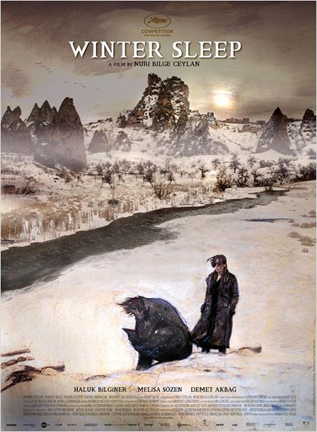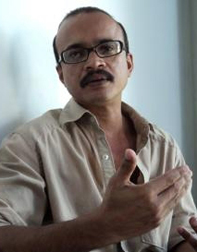|
Winter
Sleep:
Solitudes and contentions
by Dilshan Boange
 To the great delight of movie lovers, the Digital Film Academy at the
Sri Lanka Foundation Institute, held a screening of the Cannes Award
winning Winter Sleep on May 28, with an additional bonus in the form of
an introduction and some interesting insights into the movie as a visual
narrative, by Sinhala theatre practitioner and fiction writer Piyal
Kariyawasam. To the great delight of movie lovers, the Digital Film Academy at the
Sri Lanka Foundation Institute, held a screening of the Cannes Award
winning Winter Sleep on May 28, with an additional bonus in the form of
an introduction and some interesting insights into the movie as a visual
narrative, by Sinhala theatre practitioner and fiction writer Piyal
Kariyawasam.
Directed by Nuri Bilge Ceylan, Winter Sleep is a 2014 Turkish drama
adapted from the short story, 'The Wife', by Anton Chekhov. Set in
Anatolia, it presents a story that is very tightly bound to the
landscape in which it is set. The movie won the Palme d'Or and the
FIPRESCI Prize at the 2014 Cannes Film Festival, and was selected as the
Turkish entry for the Best Foreign Language Film at the 87th Academy
Awards.
Among some of the notable points that Kariyawasam brought out for the
audience, were factors like how themes and love and domestic conflicts
are portrayed. Understanding the interplay of relationships between the
central characters and the aspirations or lack of them is also a
significant matter that helps the viewer gauge the motives behind the
way in which frictions arise. Another point was the manner in which
dialogue has been presented, like theatre being infused to the
narrative. Kariyawasam said certain scenes seem almost as though they
were more suited for stage theatre than film.
Winter Sleep gave me as a Sri Lankan a view of a landscape, a
geography that was absolutely fantastic in terms of unusualness. The
story is set in a rural area characterised by rock outcrops that have
moulded a somewhat nature bound form of housing. Watching the film and
of course the manner in which it has been filmed will impress on the
viewer how much the landscape and the atmosphere affects the nature of
the inhabitants. The landscape itself, I felt imposes a solitude upon
the lives of the main characters and their mindsets. The atmosphere
creates a quietude that grips the people and almost sentences them to an
inward silence that makes them solitary creatures.
|

Piyal Kariyawasam |
The central character is Aydin a man of many attributes. He is a
retired thespian who has considerable knowledge about the Turkish
theatre. He is a writer who has published several books and regularly
writes to periodicals. And he is also a businessman mainly operating in
the hospitality sector, his establishment being the Othello Hotel. The
other characters who are within his immediate domestic setup are - his
young wife Nihal, his divorcee sister Necla and his staffers who help
run the establishment.
Another layer in the story is how Aydin's tenants face some severe
financial debility and seek his munificence, only to see that his mettle
as a landlord and businessman cannot be affected easily with appeals to
'presumed humanism'.
He is a man immersed in his world of writing, literature, and
philosophical interests. One of the inner conflicts that is brought out
about what Aydin's work as a writer means to the world at large is
whether or not he is writing about the subjects he knows best and is
instead writing about things that may seem thought provoking due to
controversy being bound to the topic in the context of political
realities. Another topic of introspective thought that is contentious to
Aydin is whether he has wasted the best years of his life on things that
didn't matter as much? The question of how much a man has achieved when
looking back and how what can be the yardsticks to gauge success is a
subtle yet sensible question that comes out in the film.
The issues related to conflicting emotions between Aydin and his
young wife Nihal are brought out slowly and occupy the climatic points
of how the story will end. Nihal is shown as a woman trapped by her
circumstances of the comforts in life provided by her wealthy husband
and also the geography that has placed them in a cocooned state of
solitude, which deprives her of a vibrant social life. Aydin on the
other hand has created a lifestyle, which he is very content with and
distrusts new faces and initiatives that may create trouble in the
future.
Beneath the exteriors of the characters like Aydin and Nihal, we come
to learn of voices and sensibilities that have practically no means to
be expressed except through conflict of words and sentiments.
We see how their intentions to do good have to be at times kept in
secrecy. The film speaks of how on one hand, the need for an existential
investigation of their lives is approached through their introspective
conversations that arise through contentions. And on another level it
seems to say that bringing out our issues may not be an answer to the
problem unless we know how to deal with them, once they have been
brought out. |

